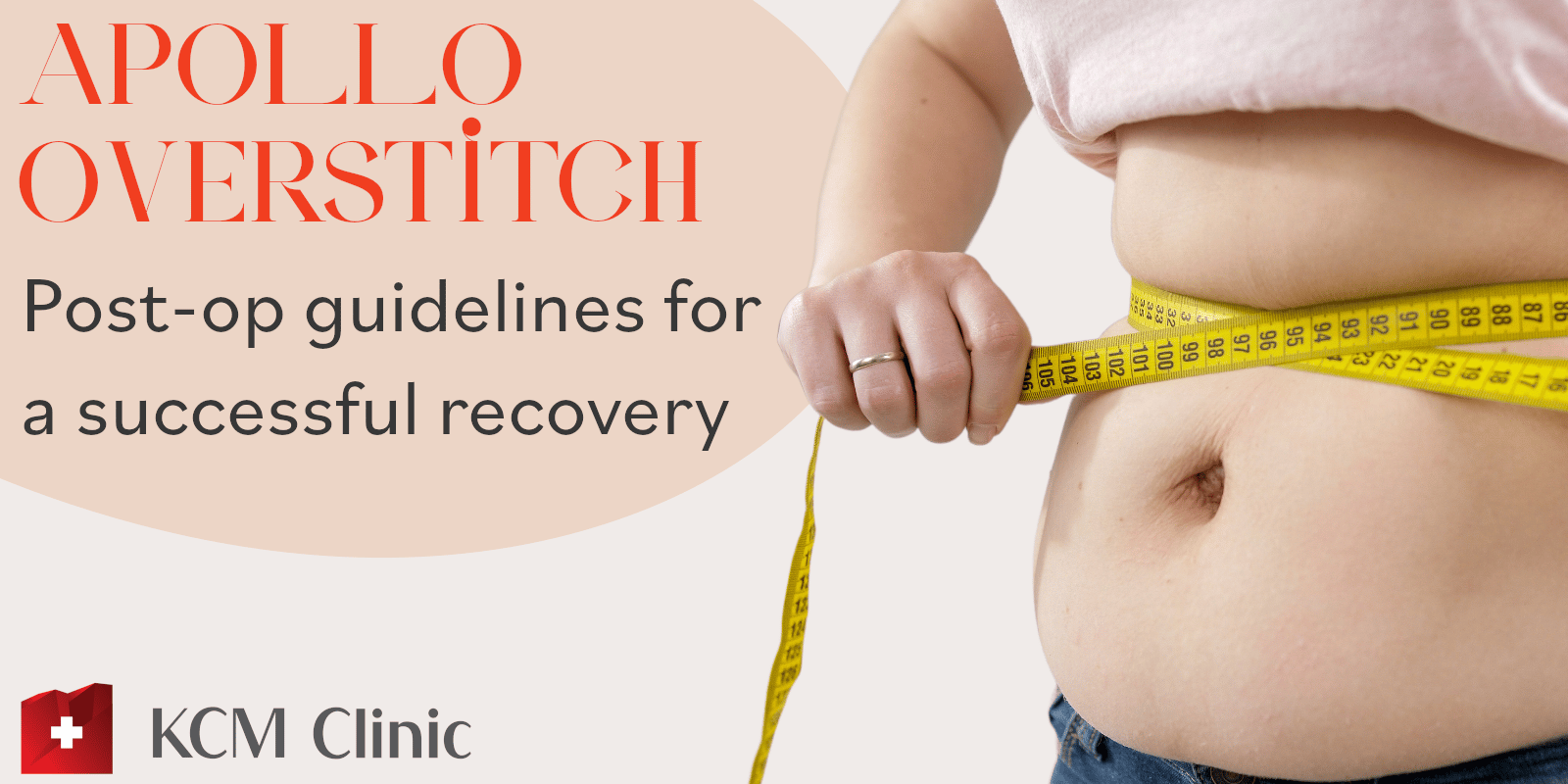The OverStitch™ Endoscopic Suturing System by producer Apollo Endosurgery is an innovative suturing technology that is used during an endoscopic sleeve gastroplasty. This is why the procedure is also known as the Apollo OverStitch. KCM Clinic prides itself in using this cutting-edge technology.
The Apollo OverStitch is becoming increasingly popular as a non-surgical procedure to help patients lose excess weight. While surgical procedures such as gastric bypass or gastric sleeve need to be performed by making a few incisions in your abdomen, the Apollo OverStitch – or endoscopic sleeve gastroplasty – is performed endoscopically. This makes the procedure less invasive and with a quicker recovery time.
Today, a large part of society is affected by obesity, negatively affecting the quality of life of many individuals. Obesity poses some serious health risks as well, including hypertension, higher risk of heart attack and stroke, joint diseases, sleep apnoea or respiratory distress syndrome. There are different bariatric procedures that can help you start a new, healthier life. We are here to help you understand what procedure best works in your case. Contact us anytime for a first consultation.
It is important to remember that the procedure itself is just a part of your weight-loss journey. In this article, we are going to explain how post-op guidelines will make the difference and ensure that procedures like the Apollo OverStitch are truly successful.
How does the Apollo OverStitch procedure work?
The Apollo OverStitch involves stapling parts of your stomach together using a special suturing device (that is, the The OverStitch™ Endoscopic Suturing System). The procedure is performed by inserting an endoscope through your mouth until the stomach. The sutures are done from the inside. This means that the procedure is incisionless, leaving no scars. Moreover, this procedure is reversible: the sutures can be taken out within a certain amount of time and the stomach can go back to its original size.
Are you a candidate for the Apollo OverStitch procedure?
Ideal candidates for the Apollo OverStitch are individuals with a BMI of 27 (you can calculate your BMI here). Surgical bariatric procedures are typically recommended for individuals who have a BMI of 32-35 or higher. This means that the Apollo OverStitch is suitable for people who are at obesity stage I who would otherwise not be eligible for more invasive procedures.
We will confirm if you are eligible for this procedure on an individual basis. During our first consultation, we will ask you questions about your overall health, if you’re taking any medications or if you have any medical conditions.
If you have any of these conditions, you might not be eligible for the Apollo OverStitch procedure:
- Inflammation in the stomach or oesophagus
- Structural changes to the upper gastrointestinal tract
- Gastrointestinal hernia
- Cancer
Women who are pregnant, are breastfeeding, or plan to have children in the upcoming year are also not eligible for the procedure.
Consultations after the procedure
Talking to someone and having the right support after the procedure is crucial. This is why KCM Clinic organises psychology and dietary support groups for our bariatric patients. They are available in English, German, and Polish. You are strongly encouraged to participate!
Dietary plan
Making sure you eat healthily is fundamental to ensure positive long-term effects of the Apollo OverStitch procedure. Your new dietary plan may involve completely new ways to consume food. Your eating habits may need a drastic change. But this is for the best!
Dietary plans typically include a high-protein and low-carb diet. You will start with pureed foods, and later transition to solid foods. Medications, vitamins, or supplements may also be prescribed for a balanced diet. Here are some of the recommendations that are typically included in the post-treatment diet plans:
- Eat food to a moderate temperature
- No sodas
- Eat in small portions every 2-4 hours
- Chew thoroughly, without haste, and stop eating when you are comfortably satisfied
- Drink fluids 8-10 times per day, 100 ml – 150 ml each portion
- Avoid drinking 30 minutes before and 30 minutes after a meal
- Avoid food that is too sweet, spicy, sour, greasy, hot or cold
If these guidelines seem overwhelming, don’t worry! We understand that it can be a big change in your everyday life. But consider that patients typically adjust and make these new habits part of their new lifestyle with just a little effort. It might take some time and commitment but it will serve you well in the long run!
Physical exercise
Working out will help you lose more weight, keep you healthy, and give you energy. At first, you will start with gentle movements or going for walks. It is important to make you strong, fit and active right after the procedure. Any intense physical exercise will not be possible for the first few weeks. You will gradually start with cardio and strength training and then transition to more intense workouts.
Consider making daily exercise part of your daily routine: it will help you during your recovery after the Apollo OverStitch procedure but also to improve your health overall.
Follow ups and emotional challenges after an Apollo OverStitch
We are going to keep tabs on your health once you’re back home. We want to know how you are doing, how you are feeling and how we can further support you. Consider having a good support system around you that can support your physical and mental health: friends and family, counselling, or support groups have proven to be very helpful for all our bariatric patients.
Our Facebook group Weight Loss Surgery Poland welcomes weight-loss patients to discuss and share their stories in a safe space.
Send Request
Register
Visits, hospital procedures
Bariatric Surgery Center
Plastic Surgery Center
Spine Surgery Center
Dental Clinic
OMEGA Imaging Diagnostic Center
Work hours
KCM Clinic Wrocław
Chat KCM Clinic
Locations
KCM Clinic Jelenia Góra
KCM Clinic Wrocław
Parking








